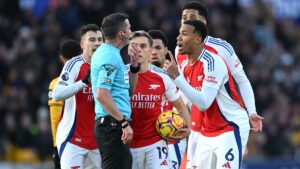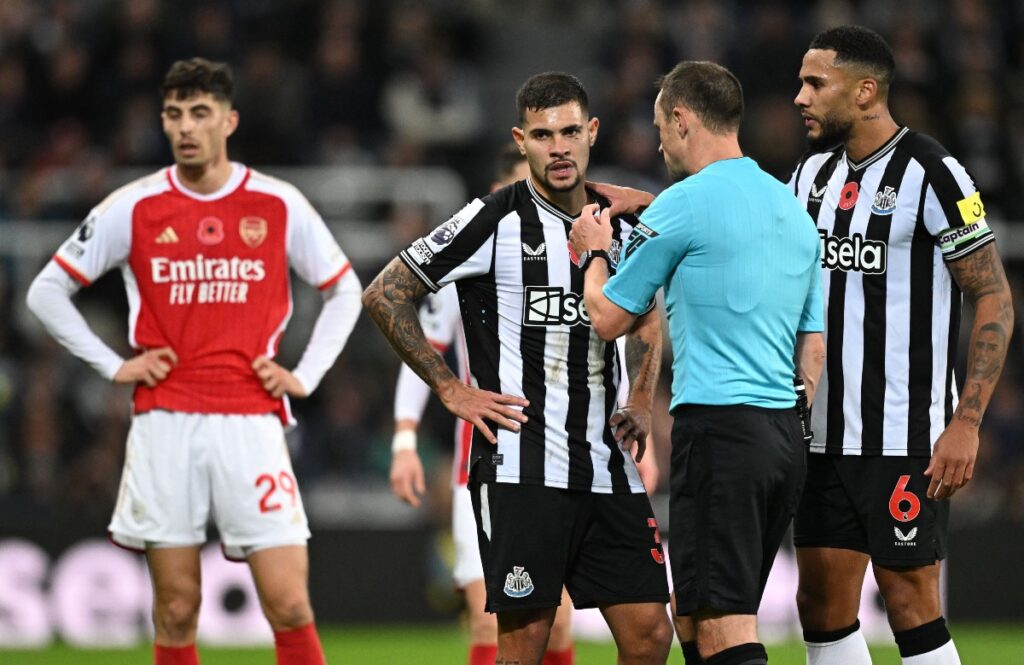Premier League and PGMOL statements: Arsenal defender may miss Carabao Cup semi-final
Newcastle United are still monitoring the ramifications from Myles Lewis-Skelly’s contentious red card against Wolves on Saturday. Referee Michael Oliver awarded the Arsenal defender a straight red card.
Lewis-Skelly was sent off after preventing Matt Doherty from initiating a counterattack from the edge of his own penalty area. The 18-year-old looked to catch Doherty on the top of his Achilles and was given a straight red card by Oliver.
While Arsenal players surrounded Oliver to complain, video assistant referee Darren England and assistant VAR Adrian Holmes checked and confirmed the ruling. They found it significant foul play since Lewis-Skelly not only stopped a counter-attack but also endangered Doherty.
Although Arsenal won the game 1-0, there was widespread dissatisfaction among the squad, fans, and Gunners manager Mikel Arteta. Oliver received particularly harsh criticism, with Arsenal fans threatening him and accusing him of being a Newcastle fan and simply sending Lewis-Skelly out to ensure he missed the second leg of the Carabao Cup semi-final between the two teams. As things stand, the left-back will miss Arsenal’s opening three games next month. The second game of the ban is scheduled for Wednesday, February 5, at St James’ Park.
The fallout has been tremendous, with pundits, the Premier League, and the PGMOL all involved. Keith Hackett, an ex-referee, spoke with Football Insider and delivered his opinion. He has backed Arsenal to successfully overturn the red card. “That was an extremely terrible red card. It was a reckless challenge, deserving of a yellow. “He should appeal,” the 80-year-old decided.
ChronicleLive examines the statements issued following the incident and what has been stated about VAR.
Immediate Statement
The Premier League issued a statement on Saturday clarifying why VAR did not intervene to overturn Lewis-Skelly’s red card.
“The referee’s call of a red card for Lewis-Skelly was checked and confirmed by VAR, who deemed his challenge to have been serious foul play,” the note stated.
PGMOL for Oliver
Following Lewis-Skelly’s dismissal, Oliver is believed to have faced online vitriol for his decision, and the Professional Game Match Officials Limited (PGMOL) has now issued a stern response.
Following the internet harassment of Oliver, a PGMOL statement read: “We are outraged by the threats and abuse made against Michael Oliver following the Wolverhampton Wanderers v Arsenal match.
“No official should be subjected to any type of harassment, let alone the heinous attacks against Michael and his family during the last 24 hours.
“The police are aware, and a number of investigations have commenced. We are supporting Michael, and all those affected, and are determined to tackle this unacceptable behaviour.
“Sadly, this is not the first time a match official has been forced to deal with threats in recent times. We will continue to support all investigations.”

Red card stance
Although there has been a huge amount of anger at Oliver’s decision, PGMOL have appeared to back why he chose to hand Lewis-Skelly a red card. The Mirror’s Darren Lewis spoke to the PGMOL and shared their verdict on Sunday.
“I know that the PGMOL’s position is that the challenge was extremely late, and the point of contact was high,” Lewis relayed. “That’s their position, and they supported Michael Oliver and Darren England.
“They felt that Darren had seen nothing in the replays to suggest that the decision taken by Michael Oliver was wrong. And so that’s why they were supportive of both men.
“I also am aware that the PGMOL feel aggrieved at the tidal wave of criticism they have had from ex-players within the game. They feel terms like ‘the worst decision ever’ are quite sensationalist from their point of view because they are saying that you could make a legitimate case from seeing that footage for suggesting that Michael Oliver was right to take the decision that he did.”
VAR protocol
Former referee turned pundit Dermot Gallagher has been discussing the role of VAR in the incident. Gallagher believes that better intervention could have helped Oliver and prevented some of the fall-out.
“One of the dangers we alluded to earlier in the season is freeze frame pictures. A freeze frame picture is great for [identifying a] point of contact – and that’s all it is! It shows you where the boot lands,” said Gallagher, speaking to Sky Sports.
“You make a great point about his (Oliver’s) position. I actually think he’s under optical illusion because he’s coming from behind, he sees the tackle go in, he thinks it’s gone down [his achilles].
“Look, it hasn’t gone down his Achilles.” But what happens is that you look at the text and it mentions point of contact. You present a static image, and everything changes, doesn’t it? A still image does not depict the first four points of speed, intensity, where he has come from, and where he is heading.
“People discuss the monitor and the VAR. It’s very intriguing. Someone told me yesterday that Darren England would have said, ‘Look, go have a look and see what you think’. That is excellent in principle, but it is not part of the protocol. It had to be, he believes it’s a plain and apparent mistake, and he advises Michael to leave.
“What happens next is up to him.” If he had gone to the monitor, he might have kept his ground. He could have stated, ‘I still think it’s a red card,’ but that didn’t happen. I believe the follow-up to it has sparked huge controversy. It has resulted in some quite caustic and unwarranted follow-up.
